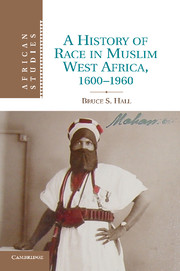Book contents
- Frontmatter
- Contents
- List of maps and figures
- Acknowledgments
- Note on orthography
- Abbreviations used in references
- Glossary
- Introduction
- PART ONE Race Along The Desert Edge, C. 1600–1900
- 1 Making Race in the Sahel, c. 1600–1900
- 2 Reading the Blackness of the Sudan, c. 1600–1900
- PART TWO Race And The Colonial Encounter, C. 1830–1936
- PART THREE The Morality of Descent, C. 1893–1940
- PART FOUR Race and Decolonization, C. 1940–1960
- Conclusion
- Index
- Misc-endmatter
- References
2 - Reading the Blackness of the Sudan, c. 1600–1900
Published online by Cambridge University Press: 05 August 2011
- Frontmatter
- Contents
- List of maps and figures
- Acknowledgments
- Note on orthography
- Abbreviations used in references
- Glossary
- Introduction
- PART ONE Race Along The Desert Edge, C. 1600–1900
- 1 Making Race in the Sahel, c. 1600–1900
- 2 Reading the Blackness of the Sudan, c. 1600–1900
- PART TWO Race And The Colonial Encounter, C. 1830–1936
- PART THREE The Morality of Descent, C. 1893–1940
- PART FOUR Race and Decolonization, C. 1940–1960
- Conclusion
- Index
- Misc-endmatter
- References
Summary
A SERVILE ESTATE?
As politically ascendant pastoralist intellectuals in the Sahel redefined themselves as distinct from those they called blacks, they also devoted attention to fixing the social and political meanings of blackness into a coherent ideological form. To do this, Sahelian intellectuals had to do more than reimagine the histories of the arrival of the first Muslims in the Sahel; they also needed to develop a set of particular interpretations of Islamic law that would juridically define blacks as people with meaningful legal disabilities. This chapter focuses on the ways that collective heritable social status was defined in the legal literature of the Sahel, and how blackness was made into a marker of permanent de jure inferiority. I will focus largely on several important collections of legal opinions written in the seventeenth and eighteenth centuries. By examining particular legal opinions, I will uncover some of the specific contexts in which racial claims were made and the concrete ends that these arguments aimed at achieving.
Blackness gained legal meaning in the seventeenth and eighteenth centuries in the Sahel. By the beginning of the nineteenth century, Muslim scholars in the region had accumulated a set of theoretical legal tools that could be used to render blacks as inferior to nonblacks. The importance of these developments is evident in the case of the forgery of the “Taʾrīkh al-fattāsh,” an important seventeenth-century chronicle of the history of the Niger Bend.
- Type
- Chapter
- Information
- A History of Race in Muslim West Africa, 1600–1960 , pp. 69 - 104Publisher: Cambridge University PressPrint publication year: 2011



